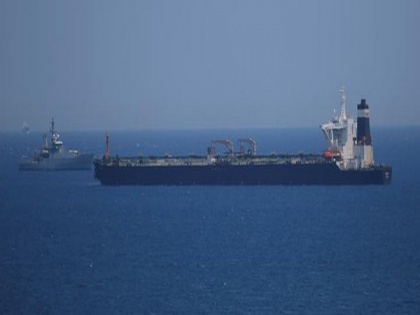Iran vessels blocked British commercial vessels, says UK
By ANI | Published: July 11, 2019 01:58 PM2019-07-11T13:58:24+5:302019-07-11T14:15:07+5:30
The UK on Thursday confirmed that three Iran vessels unsuccessfully tried to block the passage of a British commercial vessel through the Strait of Hormuz.

Iran vessels blocked British commercial vessels, says UK
The UK on Thursday confirmed that three Iran vessels unsuccessfully tried to block the passage of a British commercial vessel through the Strait of Hormuz.
"Three Iran vessels attempted to impede the passage of a commercial vessel, 'British Heritage,' through the Strait of Hormuz," the Russia Times quoted UK government as saying.
London also said that it was forced to position a war tanker between the Iran vessels and 'British Heritage'.
However, Iran has denied the reports saying their patrol boats were carrying out routine duties.
The incident was first reported by CNN, which quoted US officials saying that the British Heritage tanker was crossing into the Strait of Hormuz area while passing the Persian Gulf region when it was approached by the Iran boats
The Irans ordered the ship to change its course and stop in nearby Iran territorial waters, the officials said.
The incident comes amid strained ties between Iran and the US after the latter pulled out from the Joint Comprehensive Plan of Action (JCPoA) last year, blaming Tehran for supporting state-sponsored terrorism and conflicts.
Earlier on Wednesday, Iran President Hassan Rouh had threatened that the UK "will see the consequences" after an Iran oil tanker bound for Syria was seized by Gibraltar officials and UK Royal Marines last week.
Trump had accused Iran of "secretly" enriching urum for a long time, warning that more sanctions would be imposed "substantially" on Tehran soon.
On the same day, an emergency meeting was convened by the International Atomic Energy Agency (IAEA) at the behest of the US, to discuss the current status of the 2015 nuclear deal.
The pact was signed by five countries -- the US, the UK, Russia, China and Germany, and the European Union -- with an aim to limit Iran's civilian energy programme, thereby preventing it from developing nuclear weapons at some point in the future, in exchange for relief from sanctions that were crippling the country's economy.
While Iran is yet to withdraw fully from the agreement, it recently announced its decision to increase nuclear enrichment in response to the new US sanctions.
On Monday, the Atomic Energy Orgsation of Iran announced that the country has officially surpassed the 3.67 per cent urum enrichment limit set under the historic 2015 nuclear deal and could consider increasing the stockpile to 20 per cent in the future.
( With inputs from ANI )
Open in app